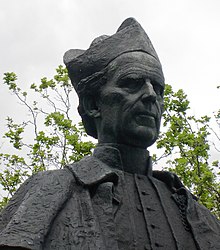Daniel Mannix

Daniel Patrick Mannix (born March 4, 1864 in Deerpark, Rathluirc , County Cork , Ireland , † November 2, 1963 in Melbourne ) was an Australian Catholic clergyman of Irish descent and Archbishop of Melbourne .
biography
After attending a seminary , he was ordained a priest for the diocese of Cloyne on June 9, 1890 .
Pope Pius X appointed him on July 1, 1912 as coadjutor of the Archdiocese of Melbourne and titular archbishop pro hac vice of Pharsalus . He was ordained episcopal by the Archbishop of Armagh , Michael Cardinal Logue , on October 6 of the same year; Co- consecrators were the Bishop of Cloyne, Robert Browne , and the Bishop of Killaloe , Michael Fogarty .
With the death of Thomas Joseph Carr on May 6, 1917, he succeeded him as Archbishop of Melbourne. He held this office for almost fifty years until his death. At the same time he was military bishop of Australia .
In these roles he vigorously advocated the rights of Catholics in Australian society, particularly government support for denominational schools. After the Easter Rising in Ireland in 1916, he became an outspoken supporter of the Irish Home Rule , the autonomous self-government of Ireland.
He was also against Prime Minister Billy Hughes' call for universal conscription to be introduced at the height of the First World War in 1916/17 . His position coincided with an emotional identification with the working class , with whom he was highly regarded. The upper classes of society demanded his deportation during this period.
After being celebrated in the United States in 1920 , he returned to Europe , but was refused entry to Ireland by the British government. During his absence he was represented by the chancellor of the archdiocese, John Barry , who was also administrator of St. Patrick's Cathedral in Melbourne , and later by his former private secretary John Joseph Lonergan .
His social views, which included an aversion to capitalism , brought him close to the ideas of the Australian Labor Party (ALP) for several years . However, he increasingly viewed communism as a greater danger, so that after the split in the ALP in the mid-1950s, he supported the Democratic Labor Party (DLP).
His lay involvement and argumentative nature made him an influential force in Australian society and politics for half a century.
Web links and sources
- Australian Dictionary of Biography
- Biography (Genealogy.com)
- Apostolic succession
- CHAMBERS Biographical Dictionary , pp. 1000, 2002, ISBN 0-550-10051-2
| predecessor | Office | successor |
|---|---|---|
| Thomas Joseph Carr |
Archbishop of Melbourne 1917–1963 |
Justin Daniel Simonds |
| Thomas Joseph Carr |
Military Bishop of Australia 1917–1963 |
Thomas Absolem McCabe |
| personal data | |
|---|---|
| SURNAME | Mannix, Daniel |
| ALTERNATIVE NAMES | Mannix, Daniel Patrick (full name) |
| BRIEF DESCRIPTION | Australian clergyman, Archbishop of Melbourne |
| DATE OF BIRTH | March 4, 1864 |
| PLACE OF BIRTH | Deerpark, Rathluirc , County Cork , Ireland |
| DATE OF DEATH | November 2nd, 1963 |
| Place of death | Melbourne |